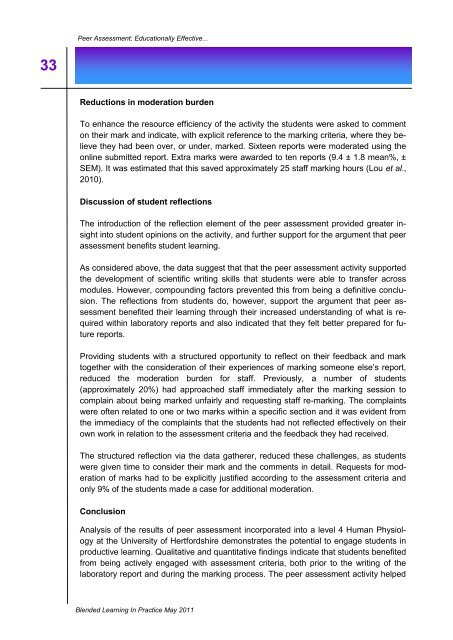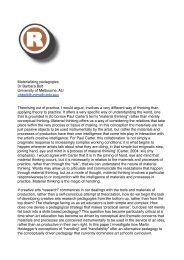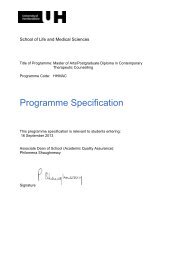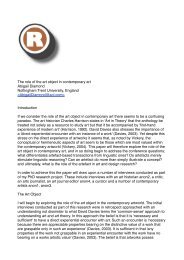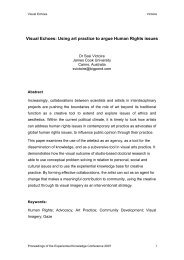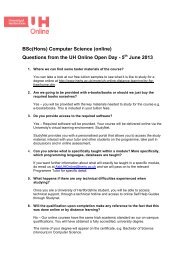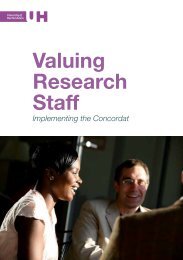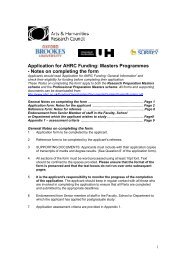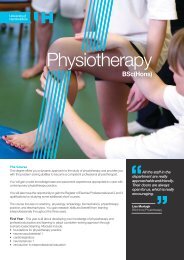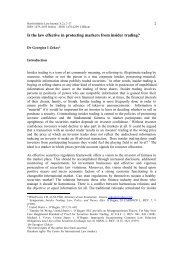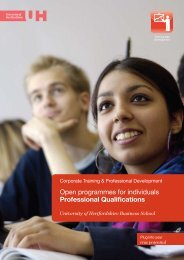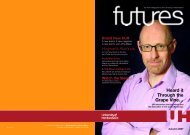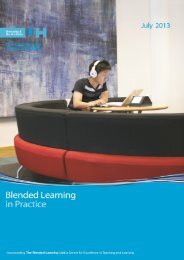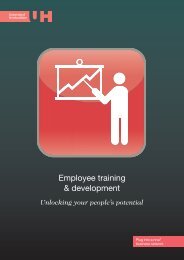3 - University of Hertfordshire
3 - University of Hertfordshire
3 - University of Hertfordshire
Create successful ePaper yourself
Turn your PDF publications into a flip-book with our unique Google optimized e-Paper software.
Peer Assessment: Educationally Effective...33Reductions in moderation burdenTo enhance the resource efficiency <strong>of</strong> the activity the students were asked to commenton their mark and indicate, with explicit reference to the marking criteria, where they believethey had been over, or under, marked. Sixteen reports were moderated using theonline submitted report. Extra marks were awarded to ten reports (9.4 ± 1.8 mean%, ±SEM). It was estimated that this saved approximately 25 staff marking hours (Lou et al.,2010).Discussion <strong>of</strong> student reflectionsThe introduction <strong>of</strong> the reflection element <strong>of</strong> the peer assessment provided greater insightinto student opinions on the activity, and further support for the argument that peerassessment benefits student learning.As considered above, the data suggest that that the peer assessment activity supportedthe development <strong>of</strong> scientific writing skills that students were able to transfer acrossmodules. However, compounding factors prevented this from being a definitive conclusion.The reflections from students do, however, support the argument that peer assessmentbenefited their learning through their increased understanding <strong>of</strong> what is requiredwithin laboratory reports and also indicated that they felt better prepared for futurereports.Providing students with a structured opportunity to reflect on their feedback and marktogether with the consideration <strong>of</strong> their experiences <strong>of</strong> marking someone else‟s report,reduced the moderation burden for staff. Previously, a number <strong>of</strong> students(approximately 20%) had approached staff immediately after the marking session tocomplain about being marked unfairly and requesting staff re-marking. The complaintswere <strong>of</strong>ten related to one or two marks within a specific section and it was evident fromthe immediacy <strong>of</strong> the complaints that the students had not reflected effectively on theirown work in relation to the assessment criteria and the feedback they had received.The structured reflection via the data gatherer, reduced these challenges, as studentswere given time to consider their mark and the comments in detail. Requests for moderation<strong>of</strong> marks had to be explicitly justified according to the assessment criteria andonly 9% <strong>of</strong> the students made a case for additional moderation.ConclusionAnalysis <strong>of</strong> the results <strong>of</strong> peer assessment incorporated into a level 4 Human Physiologyat the <strong>University</strong> <strong>of</strong> <strong>Hertfordshire</strong> demonstrates the potential to engage students inproductive learning. Qualitative and quantitative findings indicate that students benefitedfrom being actively engaged with assessment criteria, both prior to the writing <strong>of</strong> thelaboratory report and during the marking process. The peer assessment activity helpedBlended Learning In Practice May 2011


